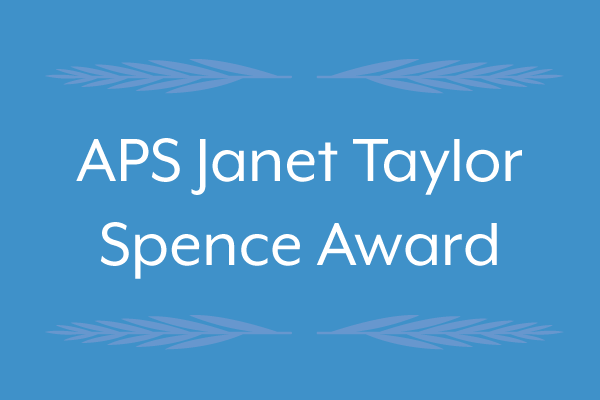Seven Psychological Scientists Receive 2021 APS Janet Taylor Spence Award for Transformative Early-Career Contributions

The Association for Psychological Science (APS) is pleased to announce the seven recipients of its 2021 Janet Taylor Spence Award for Transformative Early Career Contributions. The Spence Award recognizes APS members who have made transformative early career contributions to psychological science.
“The winners of the 2021 Spence Award have shown innovative research ideas and made meaningful contributions that have helped advance psychological science,” said APS President Shinobu Kitayama (University of Michigan). “I join my colleagues in applauding the zeal and creative work of these remarkable individuals.”
APS represents more than 30,000 leading scientists, academics, clinicians, researchers, educators, administrators, and students from more than 80 countries.
The Spence Award is named in honor of Janet Taylor Spence, the first elected APS President. Spence’s career exemplified transformative contributions to psychological science. She developed new approaches to research and pioneering tools, including the Taylor Manifest Anxiety Scale and the Attitudes Toward Women Scale. She also epitomized the spirit of crossing disciplinary boundaries with work on topics ranging from schizophrenia to developmental psychology to gender bias.
2021 APS Janet Taylor Spence Award Recipients
- Arielle Baskin-Sommers, Yale University, whose work focuses on identifying and specifying the cognitive, emotional, and environmental mechanisms that contribute to antisocial behavior (e.g., substance use, criminal activity, aggression).
- Sudeep Bhatia, University of Pennsylvania, who uses mathematical and computational models to study human judgement and decision-making.
- Eiko Fried, Leiden University, who studies individual symptoms of mental disorders and their causal relationships and who is also known for advocating open science practices.
- Celeste Kidd, University of California, Berkeley, uses computational modeling and behavioral methods to study the processes involved in knowledge acquisition, especially in young children.
- Steven Roberts, Stanford University, whose work explores the impact of descriptive versus prescriptive norms for behaviors and themes of group-based boundaries and hierarchies among both children and adults.
- Daisy Singla, University of Toronto, who is working to develop and evaluate complex, integrated mental health interventions in existing healthcare systems and low resource settings.
- Diana Tamir, Princeton University, studies social cognition—for example, how people make sense of other people and conceptualize others’ minds—and works to understand how the science of social cognition can be used to improve the lives of people with atypical social cognitive styles.
The 2021 award recipients will be featured in the March/April Observer, the APS member magazine, and honored publicly in 2021. Please contact Charles Blue at [email protected] for more information.




